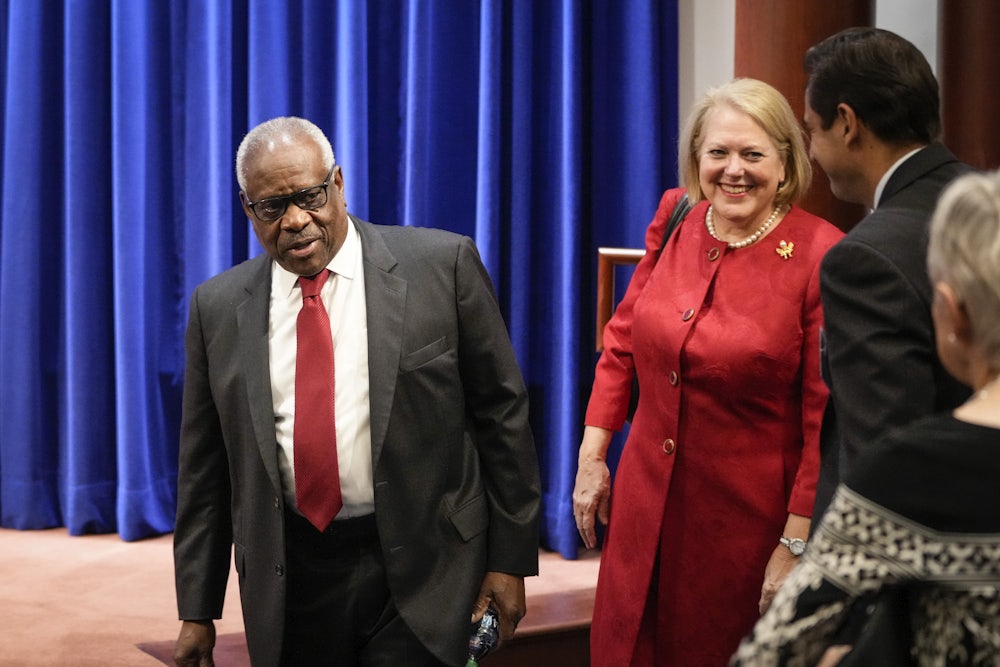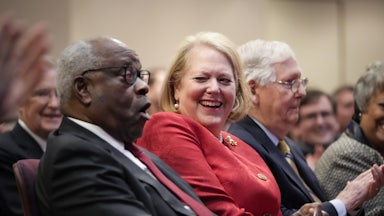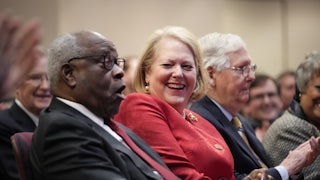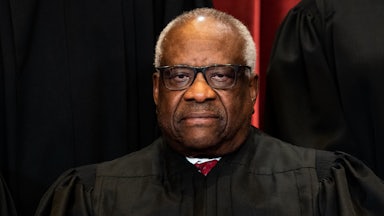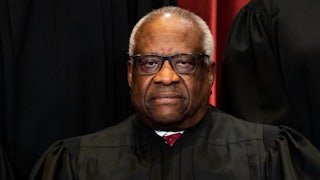Two questions arise from The Washington Post’s story of Ginni Thomas’s shocking text messages to former White House chief of staff Mark Meadows.
Question one: Will the House January 6 committee subpoena Ginni Thomas? The New York Times reported over the weekend that there’s a split among the committee’s members and top staff about whether to even ask her to appear, let alone demand it.
It’s true—as far as we know—that Thomas wasn’t a central figure in the events of January 6, 2021, at least not in the same sense that people like John Eastman and Steve Bannon were. Her messages to Meadows, gobsmacking though they were, conveyed the idea of someone on the outside, albeit with heady access, urging someone on the inside to fight for “good” over “evil.”
Even so, Thomas is hardly a spectator. She’s a hard-right zealot who is active on just about every hot-button cultural issue in American politics. She founded—didn’t just join at some point; founded—the organization that calls itself Groundswell: a group of far-right activists, nonprofit heads, journalists, and others that reportedly meets every week at the offices of Judicial Watch to plot ways to advance the right’s agenda. According to a recent New York Times Magazine investigation, she oversaw Groundswell’s project of a “30-front war” to “exchange and amplify hard-line positions on immigration, abortion, and gun control.” To give you a sense of where Groundswell is coming from, David Corn reported back in 2013 after he obtained some internal memos that the group thought Karl Rove was a squish.
And naturally, the Groundswell folks adore Donald Trump. That wasn’t always the case—Ginni Thomas supported Ted Cruz in 2016. But they all came around eventually. The Times Magazine piece has a lurid anecdote about a January 2016 meeting Thomas led between Groundswell members and Trump and aides at which there was talk of “the transsexual agenda” and parents “chopping off their children’s breasts.”
In other words: Groundswell, made up of major right-wing players like Thomas and Judicial Watch’s Tom Fitton, is exactly the kind of group that Eastman, Bannon, and others might have been plotting with. In addition to that, Thomas is also on the board of the action arm of the Center for National Policy, the secretive, right-wing outfit that coordinates all manner of political activism on the right. CNP Action “helped advance,” as the Times put it, the “Stop the Steal” movement. So Thomas was deeply involved in efforts to overturn the outcome of the 2020 election.
The Washington Post’s big scoop was based on 21 text messages Thomas sent to Meadows (along with eight that Meadows wrote back in response). Are we to assume that those 21 messages constitute the beginning and the end of her importuning? From November 7, 2020 (the day Joe Biden was declared the winner), to January 6, 2021, nearly 60 days passed. She likely wrote dozens or even hundreds of text messages and emails to key players. Was she in touch with Bannon and Eastman and other key conspirators? This is obviously a legitimate line of inquiry for the committee, with respect not only to Thomas but Fitton and other Groundswellers as well.
The Times report said that Liz Cheney was reluctant to see Thomas called lest it reflect poorly on her husband somehow (a little reminder that her allyship has limits), although she apparently has no objection to asking Thomas for a voluntary interview. Another complicating factor is that one of the committee’s top investigators, John Wood, is a former law clerk to Clarence Thomas. Eastman was a Thomas clerk, as well.
Groundswell and CNP Action and similar groups are obviously legitimate targets of inquiry. That the wife of a Supreme Court justice happens to be up to her eyeballs in these groups makes it even more relevant.
Which brings us to the second question: Will Clarence Thomas recuse himself from any future decisions having to do with the 2020 election and the insurrection?
He obviously should. Thomas’s defenders always point to the fact that Supreme Court justices aren’t subject to the ethical rules that bind other federal judges. However, as Jane Mayer reported last week in The New Yorker, justices are bound to a federal law that bars them from hearing cases in which their spouses have “an interest that could be substantially affected by the outcome of the proceeding.” That statute also stipulates that they recuse themselves in cases where their “impartiality might reasonably be questioned.”
Thomas, as Mayer notes, has already ruled on two cases related to the 2020 election. A third, which Eastman has filed against select committee Chair Bennie Thompson arguing that attorney-client privilege should shield his records from the committee’s reach, may yet reach the court.
In addition, there exists one key example of Justice Thomas staking out a lone position on the court with respect to these issues. Back in January, the court rejected Trump’s bid to block the release of documents to the select committee on the basis of executive privilege. There was one dissenter: Clarence Thomas.
Was that dissent perhaps a clue that he knew that the release of such documents might implicate his wife and “best friend”? How implicated is she? We already know that Ginni Thomas wrote to Meadows that the election fight was a “war.” She appeared to endorse—the Post’s attribution of this exact quote is a little fuzzy—a GOP congressional aide’s view that “the most important thing you can realize right now is that there are no rules in war.” If that was her view, then it stands to reason that she thought the election should be overturned by any means necessary. Suppose something like that turns up—an allegation that Ginni Thomas was part of an effort that, shall we say, pushed the bounds of legality?
It’s always useful when thinking about such matters to imagine how I’d feel if the situation were reversed. Let’s say that Ketanji Brown Jackson’s husband was not a distinguished gastrointestinal surgeon but was instead, say, the CEO of the Democracy Alliance, a group of wealthy liberal donors who direct their money to certain progressive 501(c)3s and (c)4s for various political battles? Imagine also that Patrick Jackson attended weekly, very political meetings about how to advance the rights of undocumented immigrants or transgender Americans, or fight voter suppression lawsuits. I’d write in a heartbeat that he should resign all such positions immediately, and I feel confident that all my liberal columnist friends would do the same.
But that isn’t how it works on the right. The Thomases are a moral disgrace. This one couple has put this entire nation in a terrible position. Her hard-right activism on so many matters that come before the court, up to and including the condition of our democracy, and his hand-waving insouciance about it all, have done huge damage to the Supreme Court’s reputation. The select committee can’t fix that, but at least it can try to get to the bottom of what Ginni Thomas knew and did—by slapping her, once she inevitably refuses to appear voluntarily, with the subpoena she has so richly earned.
